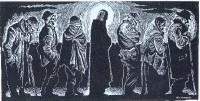

Karen House Catholic Worker
 |
Karen House Catholic Worker |
The RoundTable Invisible War Fall 1990 Major Articles
|
Download Entire Issue by Clicking Image Above (large file - it takes a minute!) |
|||
Karen House: 1840 Hogan St. Saint Louis, MO 63106 Contact Us: 314.621.4052 |
Regular Features
|
Why This Issue: One village in Salvador is bombed by its air force while in another village the army is passing out food and medicine. Both the bombs and the food are provided by the U.S. In Nicaragua the contra war is over but U.S. intervention continues through heavy funding of one of the political parties in the elections. In Bolivia U.S. drug enforcement agents patrol jungles with Bolivian military. Missouri National Guard troops are building roads in Honduras. Cuba has been under a U.S. economic embargo for more than twenty-five years. In Panama U.S. military and State Department officials are posted to each ministry of their government as "advisors." Similar examples of U.S. political, economic, military and paramilitary interventions could be provided from our recent history with Angola, the Philippines, Mexico, and many other countries in Asia, Africa and Latin America. Our government and press tell us of economic development, free and fair elections, stability and "winning hearts and minds." Churches and human rights organizations tell of torture, bombings, starvation, rape, and assassination. U.S. citizens are alternately confused, angered, or paralyzed by a sense of powerlessness. When Jesus sent the disciples out to cast out demons and preach the good news to the world he warned them to be "wise as serpents and innocent as doves." We, too, must strive to be wise in our attempts to oppose evil if we are to have any hope of sustaining some innocence in the face of it. Prayer and fasting are crucial, and so is searching analysis of our reality from many points of view. All of the diverse and confusing and painful events listed above fall into a clear and meaningful pattern from the point of view of those responsible for U.S. policy. Each is an application of what policymakers refer to as '1ow-intentsity conflict." These are not random events, they are the results of a deliberate and articulate and complex policy. I find that very empowering. We do not have to oppose 100 separate events, but one unified policy, and we have 100 opportunities to do so. Our hope in this issue is to provide enough information on what low intensity conflict is to empower us to oppose it actively and effectively. For starters, as the military strategists themselves admit, it is not a low intensity conflict for those who experience it. A more apt name is 'low-visibility conflict." (LIC) We go a long way toward defeating this tactic merely by making it public and visible. Jack Nelson Pallmeyer exposes the fundamentals of LIC and reflects on its meaning as an applied theology. Donna Vukelich explores what LIC looks like when its full range of strategies are applied in one conflict Nicaragua. John Swomley gives a sense of the breadth of the policy by surveying some of its applications over the past ten years. Margaret Phillips provides groundbreaking work in showing the connections between LIC and the "drug war" in our cities. Genevieve Cassani, SSND, designed the front cover. It is inspired by a metaphor by Jack NeIson-Pallmeyer: "Neatly packaged for public consumption, low-intensity conflict is like a deadly bomb wrapped with beautiful paper." We very much regret that in one issue we cannot also explore how people in the U.S. and abroad have developed exciting ways to confront '1ow intensity conflict," and the applied theology that these communities live in response to it. Surely in the coming years this will become a very fruitful dialogue as the peoples of the Third World accompany and teach us in our struggles to live the reign of God on earth. -Virginia Druhe |
The RoundTable is 24 pages long. To download, you'll need the most recent version of Adobe Acrobat. Download Adobe Acrobat 8 here (it's easy AND free!)
Search all of the RoundTable issues for an author, subject or title here: |